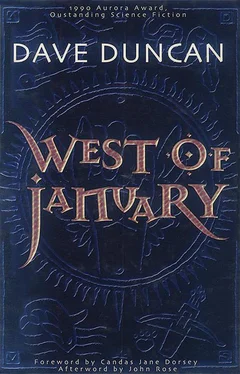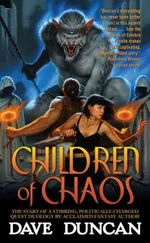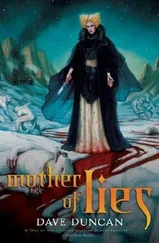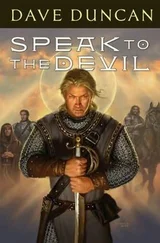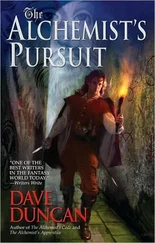Misi and Pula, Lon and Jat…and there was a fifth member of the family. Dot Jat was a lop-toothed lad, whose uneven grin already showed much native charm. At times in my delirium I had hallucinated that he was my lost son Merry, but all the babies I had sired with the seawomen would have by then grown beyond the tooth-dropping stage. Obviously Dot Jat was son of Jat Lon, who was son of Lon Kiv.
Jat spoke to Misi as one might address a very slow child—firmly yet not without affection. He called her anything from Momma to Big Pig, depending on his mood. Jat was Pula’s brother, I surmised, and Lon must be Misi’s husband. Dot’s mother seemed to be missing, but certainly Jat was the brains of the family. The older Lon Kiv seemed a much less sinister, more easygoing man. My danger, whatever it was, lurked behind the smile of Jat Lon.
The first time I held a true conversation with Jat, the cab was unusually crowded. He was kneeling on the floor, oiling a saddle. I was reclining on the bed, watching the scrub and the far-off hazy shapes of the Andes, almost lost now over the bend of the world. Another train was sometimes visible in the distance, grinding through the chaparral on a path paralleling our own. Misi, for once, had chosen to sleep in her own cab. Mostly she preferred to go to the rear and the privacy of Pula’s wagon, but now she lay at my side like a mislaid mountain, and her monstrous snores echoed back from the hills. Immobile as I was, I could not shake an uneasy belief that a bad lurch would roll her bulk on top of me and crush me to paste. Pula, shapeless in her wind-rippled green tent, was sitting out front on the step, holding the traces and gazing over the hippos’ backs in mindless silence.
Little Dot sat sleepily in one corner, doing double-jointed finger exercises. Traders’ hands are extraordinarily supple. When two traders trade they wave their fingers at each other all the time, either calculating or pretending to do so. They can count any number up to 59,048 that way, in a simple ternary system. My fingers never learned to move independently of one another so I never could make the symbols, but I learned to read them well enough, a skill that other traders did not expect in me.
“Jat,” I asked, “will you answer a couple of questions?”
Jat flickered his inevitable little smile. “Of course! But not necessarily truthfully.”
I was too tense to smile back, as I was meant to. “All right. You bought me. Why?”
“Because I can never resist a bargain.”
“Huh?”
He chuckled and sat back on his heels. Then he wiped his hands fastidiously on a rag. “I paid Kan one shirt for you. You looked dead already, but Misi said she thought you could be saved, and one shirt is a very good price for a wetlander.”
So far I could believe him. So I asked the big black question: “And what will you do with me now?”
“Oh, you’re not mine, Knobil. I gave you to Momma right away. That was why I bought you—as a gift for her.”
“A gift?”
“Misi wouldn’t have taken all this trouble doctoring you if she didn’t care for you, now would she?” Jat’s smile was not Pebble’s smile. Pebble’s had been happiness and sharing; Jat’s was calculated reassurance.
“Or if she thought I was vulnerable.” I was still very feeble, but my wits were coming back—slowly. “So why does she want me? What will she do with me?”
“Free you.” His pale brown face was as guileless as the sky.
“Why? Why go to all this trouble over a crippled slave?”
“Ex-slave.”
“But why?”
“Because we worship the sun,” Jat said solemnly. “Wetlanders are Our Lady Sun’s children—they have blue eyes and golden hair. To free a wetlander slave is a deed of great merit, well rewarded always.”
I studied him in baffled doubt. “You believe this?”
Jat peered past me at the sleeping Misi and then turned his head to look first at Pula, who was seemingly engrossed in guiding the teams, and then at Dot, intent on his finger-wiggling.
“Maybe not quite as much as some do,” Jat admitted quietly. “But…there have been cases, Knobil. I only ever met one man who’d done it—but the wealth! Four wagons, loaded to the roof. And the women…!” He sighed avariciously.
I did not believe, but I could think of no alternative explanation. Hrarrh had left me almost dead and certainly maimed for life. As a working slave I was now worthless. Why indeed should Misi struggle to heal me? Why should these hardheaded merchants waste food and shelter on me? Hrarrh himself had said that traders would buy wetlanders regardless of age or sex or health. I could think of no logical reason except what Jat and Misi were telling me—if a reason based only on religion could be called logical.
In my weakened state I was no match for Jat Lon. At outright lying I never was, I suppose. He saw my doubts, and again his eyes strayed toward Misi’s thunderous snores. He smirked.
“Momma was very grateful for the gift! I tell you, Knobil, she’s a lot of woman always, and that session was a bone-breaker! I thought I wouldn’t survive such gratitude!” He chortled lecherously. “But what a way to die, you know?”
“Huh? You mean she’s…she’s not your mother?”
Jat guffawed, causing Dot to sit up with a jerk.
“Mother? Never! Ask Lon if you want to know about my mother. I don’t recall her at all. He may.” Jat s bright eyes twinkled. “No, Misi and I are cab partners. That’s what ‘Momma’ means among traders. And she’s some partner—but don’t you dare tell her I said so!”
I struggled to rearrange my understanding of these curious people. “Then Dot’s mother—”
“A woman called Dako Jeeba. We disagreed over some furs. Sons go with fathers, of course, and we had no daughter. Misi and I get along well, but we won’t stay partners till the sun sets, I’m sure.”
I nodded and glanced at the motionless green figure out on the step. “And Pula?”
Jat glanced again at Pula’s motionless back and then smirked quizzically at his son. “Dot?” he said. “Tell Knobil what’s negotiable.”
The kid grinned. “Everything.”
“Good boy!” His father nodded. “I admit I fancied Pula, Knobil. But Lon’s a horny old goat, and he outbid me.”
Pula? That child? Misi’s daughter and Jat’s gray-pated father?
Jat chuckled and rose, holding out a hand to his son. “Come, little twister, let’s go see about a meal. Now you know more about trader ways than most people do, Knobil.”
“Pula and Lon are cab partners also?”
“Right. He pays her by the trick. Misi pays me.”
Chuckling—I suppose at the expression on my face—he squeezed by Pula and sprang down to the ground, catching Dot as he jumped down after. That was neither the first nor the last time that Jat diverted a conversation away from subjects he wished to shun. He had explained some curious customs, but not what use traders had for a crippled wetlander.
Slowly my pain and fever subsided. I progressed to the point where I could attend to my own bodily needs, a highly undignified procedure that involved hanging my rear out a window, but a great triumph for a man with planks on his legs. Dot found the performance hilarious and would bring other junior members of the trader community to watch. I suspected he made them pay him.
Gradually, too, I became less of an animal and more of a human being again. Even conversation was a skill I had to regain. The traders’ life was pleasant by most folk’s standards, varied and even luxurious. Traders ate well and enjoyed material possessions I had forgotten or had never seen. Mirrors, for example. I had not viewed my face since I was only half as old, admiring the arrival of my mustache when Violet and I had just escaped from the grasslands. I saw nothing to admire now—pallid skin and deep ravages of suffering. The freakish blue eyes were the same, yet they looked older than the world itself. I wondered how anyone else could even bear to look at them.
Читать дальше
